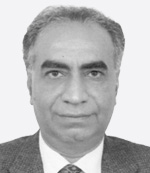Land Management
Speakers and Presentations

Vijay Madan, IAS
Secretary
Department of Land Resources

David Hickman
Head Of International Business Development, Government
Thomson Reuters
Presentation on:Enterprise Platforms for Government Land Administration

Hukum Singh Meena
Joint Secretary
Department of Land Resources
Presentation on:Integration of RoR with the cadastral maps and Registration Process

Sanjeev Trehan
Regional Manager Geospatial - SAARC
Trimble
Presentation on:Trimble Land Solutions - Transforming the way land tenure is secured and land assets are managed.

Manish Bhatt
CIO
Orange County
Presentation on:Using Geospatial Technologies to manage a $150 billion Property tax-base

Dr. Kamal Jain
Professor
IIT Roorkee
Presentation on:Real Time Cadastral Surveying Solution with a Special Imphesis to Modern GPS Technology

Jayaram Ramesh
CEO
SEACON

Nivedita Haran
Former Additional Chief Secretary Kerala
Presentation on:Protection of Public Lands and River Banks

Rita Sinha
Former Secretary
Department of Land Resources

Rakesh Prasad
Technology Architect
Aadhaar Authentication & Applications Division
Unique Identification Authority of India
Presentation on:Aadhaar Authentication & Seeding Process

Maj Gen (Retd) R C Padhi
Principal Consultant – Geospatial Solutions, SECON
Presentation on:Survey/Resurvey of Maheshpura Village, Rajasthan

Col Hari Prasad
Vice President - Geo Surveys
IIC Technologies
Presentation on:DI-LRMP Projects : Challenges and Issues

Himanshu Dalwadi, Nodal Officer, NLRMP
Gujarat

Manoj Misra
Geospatial Technology Evangelist
Presentation on:Comparing application of LIS as a market driver in developed vs developing countries

Bharti Sinha
Secretariat Director
Association of Geospatial Industries
Presentation on:Digital Land Records and Value to the Economy

David Jonas
AAM Group
Presentation on:Comparing And Contrasting The Various Survey Methods For Property Definition

Megha Datta
Industry Manager – NGIOs
Geospatial Media and Communications
Presentation on:Land Administration for Economy and Society
The one-day programme on Transforming Land Records Management with Technology will aim to connect stakeholders of land administration in the country with technology providers and researchers in order to enhance citizen-centric services and build a strong, resilient land records system.
Target Audience
- Senior officials from all State land revenue, settlement, survey agencies
- Technology and service providers for cadastral mapping, GIS and land related services
- NGOs, Research and academic institutions committed to issues of land administration
Programme Objectives
- Highlight role of ICT and geospatial technologies for achieving DI-LRMP objectives
- Help connect DI-LRMP programme objectives with initiatives including Make in India and Digital India
- Identify avenues of improvement for digitally enhancing land administration
- Identify solutions for digitalization of land records and connecting them to registration with modern ICT and g-tech
- Bring out the strength of Indian geospatial technology providers in achieving these results
- Enable state governments in applying modern ICT and g-tech to improve services to citizens
Agenda
This session will provide an overview of the new strategies and agenda detailing the fundamentals on which the DI-LRMP is based, including single agency handling property records, mirroring principle, curtain principle and guaranteed titling. It would also call for presentation by the private sector on secure, sustainable and scalable technology adoption for achieving these goals. The discussions will involve the implications of these fundamentals on the work in progress and new approaches and procedures to be adopted.
This session invites talks from senior land and revenue offices from Indian States and the private industry on the prerequisites for adopting new strategies to achieve conclusive titling as the end goal, including technological support needed for a) accurate description of property, b) assigning unique identification of property, c) clarity on re-boundaries of property, d) integration of transfer of property & record updation and e) alignment of record with reality
Integrated land information systems when applied as a strategic decision making tool can yield a variety of benefits for verticals such as banking and insurance, agriculture, utilities and infrastructure development, disaster management etc. It can also serve as a potent tool for governance in general and can be further provided as a base for applications development to start-ups and SMEs, which is already a common practice in several countries in Europe. This session will involve presentations by stakeholders on their vision or use of LIS for sectoral application and the potential states can reach by ensuring achievement of DI-LRMP agenda

